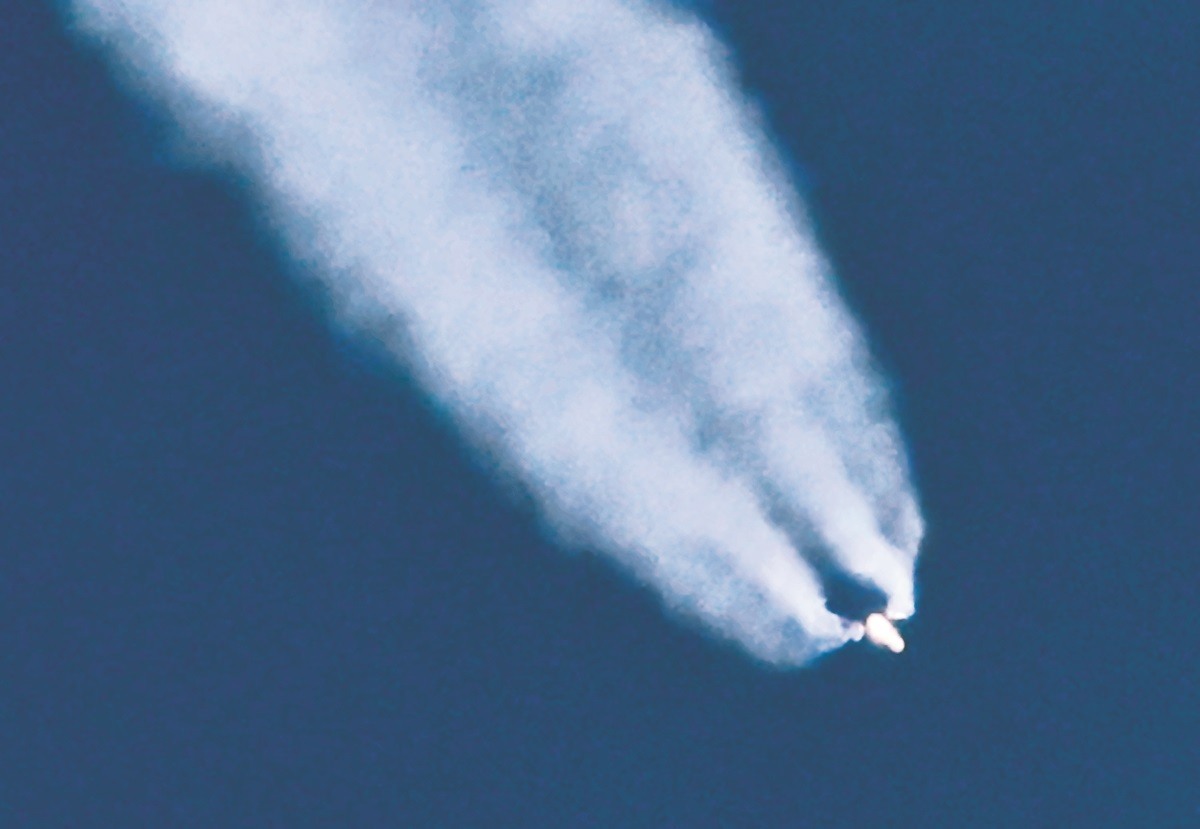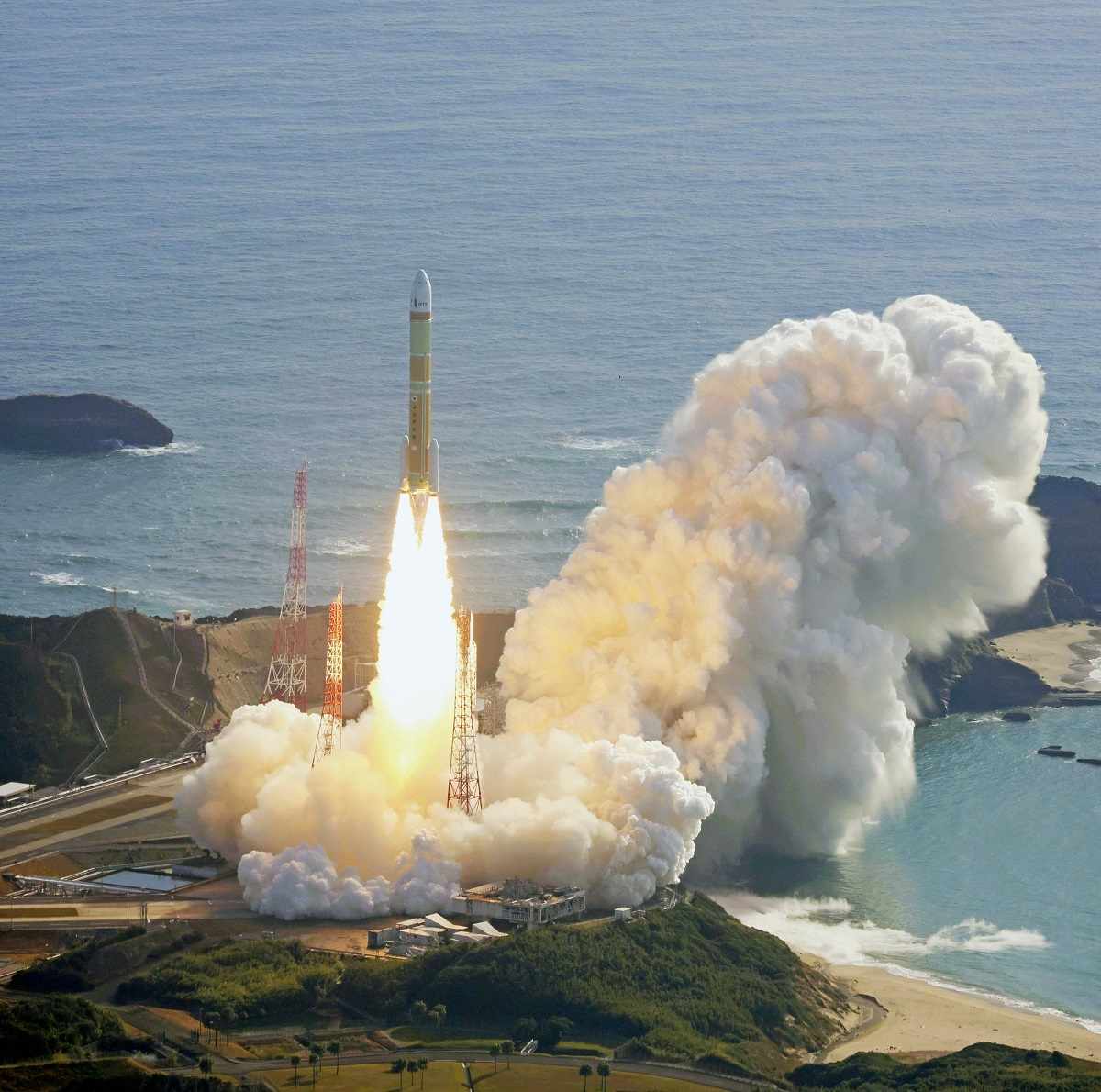Japan Aims to Enter Global Market for Satellite Launches; JAXA Works to Boost Competitiveness By Slashing Costs

An H3 rocket is seen after being launched from Tanegashima Space Center in Kagoshima Prefecture on Saturday.
17:55 JST, February 18, 2024
Japan’s mainstay H3 rocket has successfully lifted off, about a decade after its development began.
The failed launch of the first H3 rocket in March last year dented confidence in Japan’s space technology, but the nation has now managed to reach the starting line of global competition amid the growing demand for satellite launches.
Saturday’s successful launch marked the first liftoff of a newly developed mainstay rocket in 23 years, after the launch of the H2A rocket in 2001.
“The satellite was lifted into its trajectory almost exactly as we intended,” said Masashi Okada, the project manager in charge of the H3’s development at the Japan Aerospace Exploration Agency (JAXA).
It was a hard road to reach that point. JAXA struggled to develop the first-stage rocket’s LE-9 main engine, which has the 40% more propulsion than the H2A. As a result, the launch of the first H3 rocket was postponed twice.
In March last year, the vehicle’s second-stage engine did not ignite. The space agency spent about seven months identifying problems and took measures, including the reinforcement of insulation, after which it successfully launched the rocket for the first time.
The market for global space-related businesses, such as rocket launches and satellite utilization, is projected to exceed $1 trillion, or about ¥150 trillion, by 2040.
Japan aims to explore the market by replacing its H2A rockets, which will be retired in fiscal 2024, with the new H3.
The outgoing H2A’s selling point was its high reliability — it has a success rate of 97.9% among 48 past launches. However, the high cost of about ¥10 billion per launch has been a big challenge. As a result, the H2A was sent up for commercial use only five times.
The industry leader, the U.S. aerospace company SpaceX has developed rockets that are partly reusable. According to JAXA materials, SpaceX’s Falcon 9 is priced at $49 million, or about ¥7.4 billion, a highly competitive rate.
To counter its overseas rivals, JAXA worked to cut costs in the development of the H3. For instance, 90% of its electric parts were developed for automobiles, and some of its parts were produced with 3D printers. Through these and other measures, JAXA is aiming for a price of ¥5 billion.
The space agency also plans to enhance the rocket’s overall competitiveness, such as the capability to be launched on the day customers desire.
“It’s highly possible that the H3 rocket will become comparable to its overseas rivals in terms of price and share the market with them,” said Prof. Naohiko Kotake, who used to participate in development at JAXA.
Launches increasing globally
The number of rocket launches is rapidly increasing around the world. According to the Cabinet Office, 212 were conducted last year, nearly triple the figure in 2013.
Rising demand for satellite launches is fueling this trend. The number of satellites and other vehicles launched in 2022 stood at 2,368, about 11 times the 2013 number. SpaceX has secured many orders and pursued development.
A series of new rockets are planned to be launched in the United States and Europe later this year. The European Space Agency and others plan to launch the Ariane 6 between June and July, while Blue Origin, a U.S. space firm founded by entrepreneur Jeff Bezos, aims to launch the New Glenn by the end of this year.
In contrast, Japan had only two rocket launches last year, both of which were H2A rockets.
The government has set a goal of increasing the annual number of rocket launches to about 30, including private ones, by the early 2030s.
“H3 will become the foundation that supports Japan’s space development for a long period,” said Yasunori Motogawa, a JAXA honorary professor. “It’s important to build a system that can produce the vehicle in a sustainable manner.”
Top Articles in Science & Nature
-

Japan Institute to Use Domestic Commercial Optical Lattice Clock to Set Japan Standard Time
-

Japan to Face Shortfall of 3.39 Million Workers in AI, Robotics in 2040; Clerical Workers Seen to Be in Surplus
-

Record 700 Startups to Gather at SusHi Tech Tokyo in April; Event Will Center on Themes Like Artificial Intelligence and Robotics
-

iPS Treatments Pass Key Milestone, but Broader Applications Far from Guaranteed
-

iPS Cell Products for Parkinson’s, Heart Disease OK’d for Commercialization by Japan Health Ministry Panel
JN ACCESS RANKING
-

Japan PM Takaichi’s Cabinet Resigns en Masse
-

Japan Institute to Use Domestic Commercial Optical Lattice Clock to Set Japan Standard Time
-

Israeli Ambassador to Japan Speaks about Japan’s Role in the Reconstruction of Gaza
-

Man Infected with Measles Reportedly Dined at Restaurant in Tokyo Station
-

Videos Plagiarized, Reposted with False Subtitles Claiming ‘Ryukyu Belongs to China’; Anti-China False Information Also Posted in Japan























